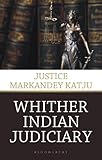Whither Indian judiciary / Justice Markanday Katju.
Material type: TextPublisher: New Delhi : Bloomsbury, 2018Description: 1 online resourceContent type:
TextPublisher: New Delhi : Bloomsbury, 2018Description: 1 online resourceContent type: - text
- computer
- online resource
- 9789386141255
- 9386141256
- 347.54 23
- KNS3407
| Item type | Home library | Collection | Call number | Materials specified | Status | Date due | Barcode | |
|---|---|---|---|---|---|---|---|---|
 Electronic-Books
Electronic-Books
|
OPJGU Sonepat- Campus | E-Books EBSCO | Available |
Online resource ; title from PDF title page (EBSCO, viewed April 30, 2018).
The book presents, for the first time, a comprehensive and analytical inside view of the Indian judiciary. Justice Katju traces the evolution of law and proceeds to analyse, with incisive insight, matters of critical importance like the appointment of judges, contempt of court, delays in justice and the challenges facing the Indian judiciary. The author draws upon his extensive tenure as a justice of the High Court and Supreme Court to draw examples and relate fascinating personal experiences. He addresses issues like judicial corruption and propagates novel proposals like lawyers to be brought under the Consumer Protection Act.Some memorable judgements which helped in shaping the Indian judiciary have been made by Justice Katju. The book covers these judgements in detail and also includes anecdotes, which bring out the captivating and complex world of the judiciary. A must read book for not just those in the legal field, but all those wanting a never before insight into the Indian judiciary.
Cover -- Half Title -- Title Page -- Copyright -- Table of Contents -- Preface -- Part I: The Evolution of Law -- Chapter 1 Constitutional Jurisprudence Sets Up the Organic Law -- Chapter 2 How do we Interpret the Constitution? -- Chapter 3 Using the Mimansa Principles in Some Judgements -- Chapter 4 Democracy and Liberty Go Hand in Hand -- Chapter 5 The Bork Nomination and Prof. Dworkin -- Chapter 6 The Opposing Points of the Hart-Fuller Debate -- Part II: The Appointment of Judges -- Chapter 7 Appointment of Good Judges is a Sine Qua Non
Chapter 8 The Method I had Adopted of Selecting Judges for the Madras High Court -- Chapter 9 Schedule Caste Persons as Judges -- Chapter 10 Some Other Experiences -- Part III: People are Supreme -- Chapter 11 Shoving Judicial Corruption Under the Carpet -- Chapter 12 A Sad Example -- Chapter 13 Raja Khan vs UP Sunni Central Waqf Board -- Chapter 14 Lawyers should also be under the Consumer Protection Act -- Chapter 15 Public Welfare -- Part IV: Contempt of Court -- Chapter 16 Should there be a Contempt of Court Act? -- Chapter 17 Contempt Power is Only to Enable the Court to Function
Chapter 18 Judges Should Know their Limits -- Part V: Delay in Justice -- Chapter 19 Be Brief, be Bright and be Off! -- Chapter 20 Delay in Justice -- Part VI: Whither Indian Judiciary? From the Labyrinth of Memory Lanes -- Chapter 21 The Judicial Function is a Sovereign Function -- Chapter 22 In Defence of Justice -- Chapter 23 The Seven Sins of the Judiciary -- Chapter 24 Obtaining an Adjournment -- Chapter 25 Barrister Abbasi and Begum Akhtar -- Chapter 26 A Message from Chief Justice Mootham -- Chapter 27 The Case of Pandit Kanhaiyya Lal Mishra's Eloquence -- Chapter 28 Nip them in the Bud
Chapter 29 My Experiences as the Chief Justice of the Madras High Court -- Chapter 30 Being a Lawyer was Considered Unfit for Ladies -- Chapter 31 Some Other Thoughts -- Chapter 32 Some Memorable Cases that Shaped the Indian Judiciary -- Chapter 33 The Urdu Couplet of Faiz Impressed Pakistan President and Prime Minister -- Chapter 34 On the Subject of Judicial Review of Statutes -- Chapter 35 Criminal Court should not Decide a Case in Lawyers' Absence -- Chapter 36 My most Difficult Case and the Nithari Killings -- Chapter 37 An Untold Story -- I was almost Sacked -- Conclusion
eBooks on EBSCOhost EBSCO eBook Subscription Academic Collection - Worldwide
There are no comments on this title.

